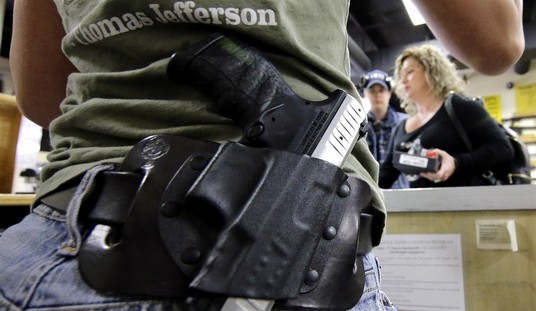I mentioned this story during today’s Bearing Arms’ Cam & Co., but it really deserves a post of its own. How many times have we as gun owners talked about better enforcing existing laws on the books, rather than trying to put a bunch of new laws in place that are all aimed at legal gun owners? Meet the poster child for that argument. His name’s Terrell Anthony.
Anthony is accused of shooting and killing his wife in front of her children in their Louisiana home on Monday night, but he shouldn’t have been there in the first place. As it turns out, Terrell Anthony was also arrested on murder charges earlier this year in a neighboring parish, but was released on $300,000 bond. The story gets even worse from there.
The man suspected of fatally shooting his wife in front of her nanny and two children Monday night had removed his court-ordered ankle monitoring device nine days prior, authorities said Wednesday morning.
Terrell Anthony, 37, appeared in Livingston Parish Court for an initial hearing in which Judge Brenda Bedsole Ricks ultimately denied bail for the man who was already out on bond in an East Baton Rouge Parish murder case when he shot and killed Jessica Clark, 31, according to authorities.
“I don’t think this guy should have been out on the street. That’s my personal opinion,” Livingston Parish Sheriff Jason Ard told reporters Wednesday afternoon, noting that his office had nothing to do with the conditions of Anthony’s release in the neighboring parish. “Hopefully a lot of people in our parish can sleep a little better tonight knowing that he’s behind bars right now.”
We’ve got a couple of different failures of the criminal justice system to deal with here. First, there’s the matter of Anthony being able to bond out on a murder charge. Terrell Anthony wasn’t unknown to the criminal justice system. He spent six months in jail for abusing Jessica Clark back in 2016. Last September, he got out of prison after serving a brief sentence for cocaine possession, before being arrested later in that autumn for the 2017 murder of David Walker. Why on earth a judge would grant him bond in a murder case is beyond me, especially since the circumstances surrounding the murder suggest that Anthony was a danger to the community. He shouldn’t have been able to allegedly murder his wife in front of her children, because he should have been behind bars in the first place.
As if that wasn’t bad enough, there’s the fact that a murder suspect cut off his GPS monitoring device, and nobody noticed until he allegedly committed another murder nine days later. Who’s monitoring the monitoring device? As it turns out, it’s not the sheriff’s office.
A private company called Home Bound Monitoring was tasked with supervising Anthony when he was released on bond, court records show. That company — one of two that Baton Rouge judges often assign to their defendants — would have provided his ankle monitor, which was meant to ensure Anthony adhered to a curfew and left home only for work.
The defendants assigned to such monitoring are themselves responsible for paying the companies keeping tabs on them; those costs don’t fall to the court.
It’s unclear whether Home Bound Monitoring was aware that Anthony had removed his device several days before Clark’s death, or whether the company had been in contact with him. Nothing was filed into the court record to indicate an issue with the ankle monitor, and East Baton Rouge District Attorney Hillar Moore III said neither judges involved with the case nor his office received notification. He said if they had, prosecutors would have filed a motion to have Anthony’s bond revoked.
“My belief is if there were problems with the monitor, whether by defect or intent, that should have been reported to the court,” Moore said. “Nine days is long enough that it seems like someone should have been notified.”
Unfortunately, with the proliferation of electronic devices comes increased reports of their failing. In 2011, California officials conducted tests on the monitoring devices worn by 4,000 high-risk sex offenders and gang members, and according to the LA Times, found that “batteries died early, cases, cracked, tampering alerts failed, and reported locations were off by as much as three miles”. Parolees were able to thwart the devices by covering them in tinfoil or going indoors. Parole officers were inundated with as many as a thousand alerts per day, and meaningless alerts led officers to worry that they were missing actual instances of fleeing parolees.
Trouble with monitoring devices is not limited to California. An audit in Tennessee found that 80 percent of alerts from offender monitoring devices were not checked by officers. Similar issues came to light in Colorado and New York when officers missed or ignored repeated alerts of device failure and then several parolees committed violent crimes. Officers in Florida were so overwhelmed with alerts that they stopped all real-time notifications, save those relating to device removal, and as a result, did not notice when one parolee broke his curfew 53 times in one month before killing three people.
Again,Jessica Clark should be alive today. The criminal justice system failed her on multiple levels, and it cost her her life. Terrell Anthony should not have been free to begin with. He should have been held without bond while he awaited trial for murdering David Walker. He should not have been at home wearing an ankle monitor, but when he cut that monitor off his leg, the company contracted by the criminal justice system to keep track of Terrell Anthony should have alerted authorities. It appears they did not, or if they did, absolutely nothing was done.
Terrell Anthony, as a convicted criminal and domestic abuser, was not allowed to own a gun. He was, however, allowed to go free. That a violent criminal would continue to act violently and criminally should not be a shock. That the criminal justice system allowed it to happen should not be forgotten.









Join the conversation as a VIP Member